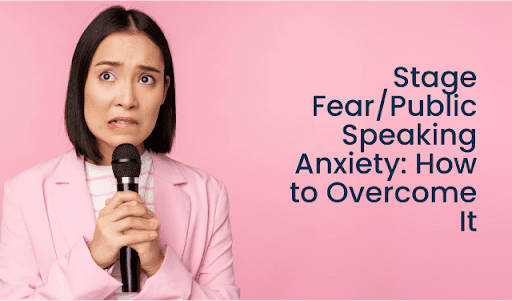Introduction
Whether at the beginning of our career or going through the ripe years of our work life, stage fear/public speaking anxiety can propel a withdrawal from public appearances. We may often find ourselves triggered during such concern, leading to under-performance, stammering or even a complete loss of the line of thought.
It is a common phenomenon among many people today and can severely impact their overall appearance, further leading to public appearance complexities. An in-depth understanding of the reasons for stage fear/public speaking anxiety, its effects, and solutions can assist with self-improvement.
What is stage fear/public speaking anxiety?
Stage fear/public speaking anxiety is often triggered when presenting or performing on a stage in front of a group. A trigger at such a crucial juncture of the public presentation can lead to feeling nervous or even paralytic, interfering with our ability to deliver.
Medically referred to as glossophobia, it can have severe impacts beyond the general anxiety symptoms such as shortness of breath, feeling nauseous, and pale. Stage fear is a severe anxiety disorder among the top causes of poor public speaking and can affect men and women equally.
A better understanding of why stage fear may grip individuals and a clear picture of the underlying self-judgements when presenting in public can be the start of overcoming this life-limiting anxiety. A subset of social phobia, stage fear can trigger whether we speak in front of a crowd or a small group of people, be it friends or strangers.
What are the reasons for stage fear/public speaking anxiety?
There are many reasons for stage fear/public speaking anxiety. Some common causes include:
1. The fear of appearing nervous:
The fear of appearing anxious may often lead to stage fear, making us doubly worried about ourselves and adding to our panic.
2. Being self-conscious:
We may get excessively conscious of self-imposed judgments regarding who we are and how we are perceived, leading to anxiety triggers.
3. Poor preparation:
We may also get trapped in stage fear if we are not prepared to present at an occasion.
4. Self-dissatisfaction:
Feeling like we’re not good enough or having limiting ideas around self-skills can act as a trigger too.
5. Limited acceptance of one’s own body:
Not being relaxed enough in our body and always looking at it in poor light can lead to dissatisfaction and stage fear.
Stage fear and public speaking anxiety are self-imposed, primarily self-imposed and curable.
What are the effects of stage fear/public speaking anxiety?
The combined effects of stage fear/public speaking anxiety include:
- Brain freeze
- Pale hands and feet
- Sweaty palms
- Dry mouth
- Nausea
- Shaky legs
- Tightened throat
- Breathlessness
- Stammering
- Feeling paralysed
While these are the day-to-day impacts of stage fear, they can lead to severe long-term personal and social complications. For instance, if we are affected by severe public speaking anxiety for an extended duration, it can lead to depression. We may even isolate ourselves from the public, friends, and family.
Suppose public appearance is a part of our work profile. Stage fear/public speaking anxiety can lead to consequences like stunted growth or if severe, performance devaluations and even unfortunate demotion. Stage fear is, however, curable with proper assistance, self-realisation, therapeutic improvement, and in extreme cases, medication.
How can we overcome stage fear/public speaking anxiety?
We can adopt several ways to overcome stage fear/public speaking anxiety. The most useful ones are as follows:
-
Refocusing our brain before speaking.
Excessive self-indulgence combined with low self-confidence can result in stage fear when presenting ourselves in front of a group of people, no matter how large. Refocusing our minds, recollecting ourselves regarding the present scenario, and taking a quick revision of why we are on stage can help keep the first panic attack at bay.
-
Learning how to relax
Discomfort in the body can reflect in the speech, interfering with a calm mindset. The best way to be comfortable is to relax our body step by step when on the stage.
-
Practising calming exercises
We can also practice calming exercises to train our brains for a relaxed state on the stage. For instance, practice being centred on the mind and body and creating a suitable space through loud rehearsals.
-
Being well-prepared for a topic
As lack of necessary preparation is a common cause of stage fear/public speaking anxiety, we must prepare well for the presentation topic.
-
Taking necessary pauses
Recollecting ourselves during a public speech can be a great way to take ourselves back to being centred from a stage fear trigger. When speaking, we can take our time to recollect with a few necessary pauses interspersed across the presentation.
-
Remaining mindful and in the moment.
Tendencies like over-indulging in ourselves often start public speaking anxiety, and we focus on ourselves more than the topic. We can thus work on bringing ourselves back and being mindful of our thoughts when on stage to be in the moment.
-
Seeking professional therapy
If facing stage fear seems too daunting to be dealt with alone, we can always reach out to a professional therapist. They can guide us step by step into self-improvement when speaking in public.
Conclusion
Medically, stage fear results from being unable to handle excessive adrenaline that the brain releases as a response when perceiving the act of public speaking as a threat to the body. Thus, the anxiety trigger is often a flight response that, if understood closely through self-monitoring, leads to stage fear/public speaking anxiety. Know that there’s always help that we can get from friends and family with a heart-to-heart conversation regarding our last-minute public presentation responses. If in need, we must never shy away from taking professional help from the United we care.
| [1] | S. Rachman, “The passing of the two-stage theory of fear and avoidance: fresh possibilities,” Behav. Res. Ther., vol. 14, no. 2, pp. 125–131, 1976. |
| [2] | W. W. Stevens, “Conquer your fear of speaking in public,” Today’s Speech, vol. 8, no. 3, pp. 15–29, 1960. |











